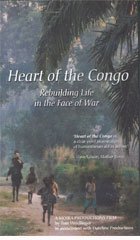
Heart of the Congo 2004
Distributed by Bullfrog Films, PO Box 149, Oley, PA 19547; 800-543-FROG (3764)
Produced by Tom Weidlinger; Moira Productions in association with Dateline Productions
Directed by Tom Weidlinger
VHS, color and b&, 57 min., in English and Swahili or French with English subtitles
College - Adult
African Studies, International Relations
Date Entered: 06/02/2006
Reviewed by Maureen Puffer-Rothenberg, Valdosta State University, Valdosta, GADecimated by years of civil war, in 2003 the eastern Congo remained unstable, its villages subject to looting, burning and massacres led by local militias known collectively as Mai Mai. Heart of the Congo profiles three humanitarian aid projects sponsored by Action Against Hunger, an organization specializing in aid to countries affected by war and natural disaster. The film shows European volunteers working with the Congolese to build a well, train nurses and establish medical clinics, and start a center to provide food for children while teaching parents about good nutrition and hygiene. The workers want to show the Congolese that their lives can be improved with resources already available to them, and they can learn to deal with problems independently, without the workers’ help.
In Kabozya village aid worker Mariona helps local men to plan and build a well. Although it is frustrating, backbreaking work, she hopes the communal well will inspire villagers to build more wells on their own. A malnutrition center at Malemba village treats malnourished children and teaches parents and children about good hygiene and healthy food. Also at Malemba, aid worker David trains Congolese nurses to run health clinics, teaching basic hygiene as well as patient care and medical techniques.
Two of the nurses are probably imposters with false nursing credentials. A Congolese worker says it is especially difficult to establish a straight and honest culture in the Congo because corruption has become common there; it sets a bad example for children and undermines peoples’ confidence in each other.
Aid workers are also hampered by a centuries-old paternal relationship between Africans and Europeans in the Congo, illustrated here with film and still photographs from years of often brutal Belgian rule. Filmmaker Tom Weidlinger describes his own failed efforts to connect with the Congolese, feeling that traditional master-servant roles are engrained on both sides. Desperately poor, the Congolese want to rely on aid workers to care for them; they continually ask Weidlinger for gifts “to remember him by.” Years of war and random violence have left the Congolese with little hope or interest in the future and they struggle to commit to long-term projects.
Weidlinger becomes a subject in his own film when he contracts malaria, then pneumonia, and must leave the bush. He leaves a camera with David and Mariona, who send disturbing footage of a ransacked health center; the Mai Mai have returned to loot villages, extorting, raping and killing villagers. The Congolese expect the Europeans, unused to violence, will give up and retreat. However, Mariona and David feel their work in the Congo was worthwhile for its effect on people’s lives in spite of later violence or attacks on their programs. The film closes with captions noting that their projects have endured and grown as of 2004.
The sound and picture qualities are excellent; even excerpts from videotape taken by aid workers during Weidlinger’s illness are professionally edited and presented. English subtitles are provided for comments from the Congolese and the French aid workers. The film effectively illustrates the practical and sociological difficulties of laying the groundwork for independence in a developing country, and gives the humanitarian workers an opportunity to explain why they continue such work in the face of seemingly insurmountable obstacles. Heart of the Congo is suitable for college-level collections supporting studies of the Congo’s struggle to establish a peaceful and productive society in the aftermath of civil war, or more generally of humanitarian aid in Africa.
Highly Recommended
Awards
- Silver Plaque, Chicago International Television Awards